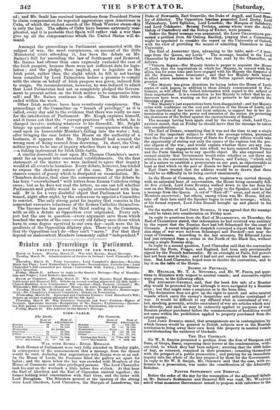Amongst the proceedings in Parliament unconnected with the subject of
war, the most conspicuous on account of the little
Ministerial crisis attending it, has been the debate on Mr. Baines's Bill for amendinc, the la,w of Settlement and Removal. Mr. Baines had oftener than once expressly excluded the ease of the Irish paupers, because there were not sufficient data for legis- lation; and the pledge, thus implied, not to legislate on the Irish point, rather than the slight which he felt in not having been consulted by Lord Palmerston before a promise to comply with the claim on behalf of Irish paupers was given, induced him to resign. On reconsideration, however, he was induced to admit that Lord Palmerston had not so completely pledged the Govern- ment to present action on the Irish matter as to compromise him- self; and Mr. Baines continues in office. Thus the little crisis ended within the week.
Other Irish matters have been vexatiously conspicuous. The proceedings of the Committee on "breach of privilege," as it is called, every day add to the evidence that there was really no case for the interference of Parliament. Mr. Keogh explains himself, and it turns out that the " corrupt practices with which he is charged involve nothing whatever to his discredit. Mr. Bright brings up questions of some " corrupt " consequences which en- sued upon an honourable Member's falling into the water ; but, after bringing the case before the House on the authority of a boatman, it appears that Mr. Bright himself had accused the wrong man of being rescued from drowning. In short, the Com- mittee proves to be one of inquiry whether there is any case at all —a fishing instrument for Irish tittle-tattle.
A similar discredit is east upon Mr. Thomas Chambers's move- ment for an inquest into conventual establishments. On the first statement of the matter we were inclined to agree that inquiry would at all events be harmless. Every debate, however, has tended to expose the shadowy nature of the case. The practical in- stances consist of gossip which is dissipated on examination. Mr. Chambers declares, that since the commencement of the debate he has been "overwhelmed*" with letters from Roman Catholics citing eases; but as ha does not read the letters, no one can tell whether Parliament and public would be equally overwhelmed with him- self. if is for a very doubtful object that Parliament has been teased, night after night, by the endeavour to appoint a Committee to convict. The only strong point for inquiry that remains is the somewhat excessive reluctance of the Roman Catholics themselves.
The Income-tax has passed its third reading in the Commons, with as idle a debate as Opposition ever originated. Every sub- ject but the one in question—every argument save those which touched the merits of the ease—every old fallacy save those which have in some degree survived to our own day—such were the in. gredients of the Opposition dilatory plea. There is only one thing that Me Opposition can't do—they can't "move." For that they depend on malecontent Members commonly called " independent."


































 Previous page
Previous page